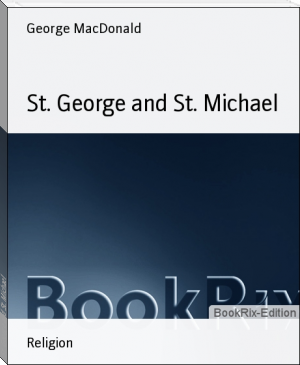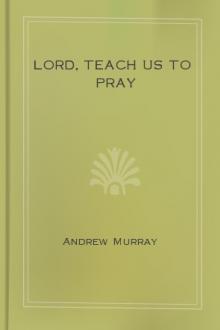St. George and St. Michael - George MacDonald (beach books .txt) 📗

- Author: George MacDonald
Book online «St. George and St. Michael - George MacDonald (beach books .txt) 📗». Author George MacDonald
pure love of liberty; the ardent attachment to liberty which most of the troopers professed, would have prevented few of them indeed from putting a quaker in the stocks, or perhaps whipping him, had such an obnoxious heretic as a quaker been at that time in existence. In some was the devoutest sense of personal obligation, and the strongest religious feeling; in others was nothing but talk, less injurious than some sorts of pseudo-religious talk, in that it was a jargon admitting of much freedom of utterance and reception, mysterious symbols being used in commonest interchange. That they all believed earnestly enough to fight for their convictions, will not go very far in proof of their sincerity even, for to most of them fighting came by nature, and was no doubt a great relief to the much oppressed old Adam not yet by any means dead in them.
At length the king led out his men for another campaign, and was followed by Fairfax and Cromwell into the shires of Leicester and Northampton. Then came the battle at the village of Naseby.
Prince Rupert, whose folly so often lost what his courage had gained, having defeated Ireton and his horse, followed them from the field, while Cromwell with his superior numbers turned Sir Marmaduke Langdale's flank, and thereby turned the scale of victory.
But Sir Marmaduke and his men fought desperately, and while the contest was yet undecided, the king saw that Rupert, returned from the pursuit, was attacking the enemy's artillery, and dispatched Rowland in hot haste to bring him to the aid of Sir Marmaduke.
The straightest line to reach him lay across a large field to the rear of Sir Marmaduke's men. As he went from behind them, Richard caught sight of him and his object together, struck spurs into Bishop's flanks, bored him through a bull-fence, was in the same field with Rowland, and tore at full speed to head him off from the prince.
Rowland rode for some distance without perceiving that he was followed; if Richard could but get within pistol-shot of him, for alas, he seemed to be mounted on the fleeter animal! Heavens!-could it be? Yes it was! it was his own lost Lady the cavalier rode! For a moment his heart beat so fast that he felt as if he should fall from his horse.
Rowland became aware that he was pursued, but at the first glimpse of the long, low, rat-like animal on which the roundhead came floundering after him, burst into a laugh of derision, and jumping a young hedge found himself in a clayish fallow, which his mare found heavy. Soon Richard jumped the hedge also, and immediately Bishop had the advantage. But now, beyond the tall hedge they were approaching, they heard the sounds of the conflict near: there was no time to lose. Richard breathed deep, and uttered a long, wild, peculiar cry. Lady started, half-stopped, raised her head high, and turned round her ears. Richard cried again. She wheeled, and despite spur, and rein, though the powerful bit with which Rowland rode her seemed to threaten breaking her jaw, bore him, at short deer-like bounds, back towards his pursuer.
Not until the mare refused obedience did Rowland begin to suspect who had followed him. Then a vague recollection of something Richard had said the night he carried him home to Raglan, crossed his mind, and he grew furious. But in vain he struggled with the mare, and all the time Richard kept ploughing on towards him. At length he saw Rowland take a pistol from his holster. Instinctively Richard did the same, and when he saw him raise the butt-end to strike her on the head, firmed-and missed, but saved Lady the blow, and ere Rowland recovered from the start it gave him to hear the bullet whistle past his ear, uttered another equally peculiar but different cry. Lady reared, plunged, threw her heels in the air, emptied her saddle, and came flying to Richard.
But now arose a fresh anxiety:-what if Bishop should, as was most likely, attack the mare? At her master's word, however, she stood, a few yards off, and with arched neck and forward-pricked ears, waited, while Bishop, moved possibly with admiration of the manner in which she had unseated her rider, scanned her with no malign aspect.
By this time Rowland had got upon his feet, and mindful of his duty, hopeful also that Richard would be content with his prize, set off as hard as he could run for a gap he spied in the hedge. But in a moment Bishop, followed by Lady, had headed him.
'Thou wert better cry quarter,' said Richard.
The reply was a bullet, that struck Bishop below the ear. He stood straight up, gave one yell, and tumbled over. Scudamore ran towards the mare, hoping to catch her and be off ere the roundhead could recover himself. But, although Bishop had fallen on his leg, Richard was unhurt. He lay still and watched. Lady seemed bewildered, and Rowland coming softly up, seized her bridle, and sprung into the saddle. The same moment Richard gave his cry a second time, and again up went Rowland in the air, and Lady came trotting daintily to her master, scared, but obedient. Rowland fell on his back, and before he came to himself, Richard had drawn his leg from under his slain charger, and his sword from its sheath. And now first he perceived who his antagonist was, and a pang went to his heart at the remembrance of his father's words.
'Mr. Scudamore,' he cried, 'I would thou hadst not stolen my mare, so that I might fight with thee in a Christian fashion.'
'Roundhead scoundrel!' gasped Scudamore, wild with wrath. 'Thy unmannerly varlet tricks shall cost thee dear. Thou a soldier? A juggler with a mountebank jade-a vile hackney which thou hast taught to caper! A soldier indeed!'
'A soldier and seatless!' returned Richard. 'A soldier and rail! A soldier and steal my mare, then shoot my horse! Bah! an' the rest were like thee, we might take the field with dog-whips.'
Scudamore drew a pistol from his belt, and glanced towards the mare.
'An' thou lift thine arm, I will kill thee,' cried Richard. 'What! shall a man not teach his horse lest the thief should find him not broke to his taste? Besides, did I not give thee warning while yet I judged thee an honest man, and a thief but in jest? Go thy ways. I shall do my country better service by following braver men than by taking thee. Get thee back to thy master. An' I killed thee, I should do him less hurt than I would. See yonder how thy master's horse do knot and scatter!'
He approached Lady to mount and ride away.
But Rowland, who had now with the help of his anger recovered from the effects of his fall, rushed at Richard with drawn sword. The contest was brief. With one heavy blow that beat down his guard and wounded him severely in the shoulder, dividing his collarbone, for he was but lightly armed, Richard stretched his antagonist on the ground; then seeing prince Rupert's men returning, and sir Marmaduke's in flight and some of them coming his way, he feared being surrounded, and leaping into the saddle, flew as if the wind were under him back to his regiment, reaching it just as in the first heat of pursuit. Cromwell called them back, and turned them upon the rear of the royalist infantry.
This decided the battle. Ere Rupert returned, the affair was so hopeless that not even the entreaties of the king could induce his cavalry to form again and charge.
His majesty retreated to Leicester and Hereford.
CHAPTER XLIV.
THE KING.
Some months before the battle of Naseby, which was fought in June early, that is, in the year 1645, the plans of the king having now ripened, he gave a secret commission for Ireland to the earl of Glamorgan, with immense powers, among the rest that of coining money, in order that he might be in a position to make proposals towards certain arrangements with the Irish catholics, which, in view of the prejudices of the king's protestant council, it was of vital importance to keep secret. Glamorgan therefore took a long leave of his wife and family, and in the month of March set out for Dublin. At Caernarvon, they got on board a small barque, laden with corn, but, in rough weather that followed, were cast ashore on the coast of Lancashire. A second attempt failed also, for, pursued by a parliament vessel, they were again compelled to land on the same coast. It was the middle of summer before they reached Dublin.
During this period there was of course great anxiety in Raglan, the chief part of which was lady Glamorgan's. At times she felt that but for the sympathy of Dorothy, often silent but always ministrant, she would have broken down quite under the burden of ignorance and its attendant anxiety.
In the prolonged absence of her husband, and the irregularity of tidings, for they came at uncertain as well as wide intervals, her yearnings after her vanished Molly, which had become more patient, returned with all their early vehemence, and she began to brood on the meeting beyond the grave of which her religion waked her hope. Nor was this all: her religion itself grew more real; for although there is nothing essentially religious in thinking of the future, although there is more of the heart of religion in the taking of strength from the love of God to do the commonest duty, than in all the longing for a blessed hereafter of which the soul is capable, yet the love of a little child is very close to the love of the great Father; and the loss that sets any affection aching and longing, heaves, as on a wave from the very heart of the human ocean, the labouring spirit up towards the source of life and restoration. In like manner, from their common love to the child, and their common sense of loss in her death, the hearts of the two women drew closer to each other, and protestant mistress Dorothy was able to speak words of comfort to catholic lady Glamorgan, which the hearer found would lie on the shelf of her creed none the less quietly that the giver had lifted them from the shelf of hers.
One evening, while yet lady Glamorgan had had no news of her husband's arrival in Ireland, and the bright June weather continued clouded with uncertainty and fear, lady Broughton came panting into her parlour with the tidings that a courier had just arrived at the main entrance, himself pale with fatigue, and his horse white with foam.
'Alas! alas!' cried lady Glamorgan, and fell back in her chair, faint with apprehension, for what might not be the message he bore? Ere Dorothy had succeeded in calming her, the marquis himself came hobbling in, with the news that the king was coming.
'Is that all?' said the countess, heaving a deep sigh, while the tears ran down her cheeks.
'Is that all?' repeated her father-in-law. 'How, my lady! Is there then nobody in all the world but Glamorgan? Verily I believe thou wouldst turn thy back on the angel Gabriel, if he dared appear before thee without thy Ned under his arm. Bless the Irish heart! I never gave thee MY Ned that thou shouldst fall down and worship the fellow.'
'Bear with me, sir,' she answered faintly. 'It is but the pain here. Thou knowest I cannot tell but he lieth at the bottom
At length the king led out his men for another campaign, and was followed by Fairfax and Cromwell into the shires of Leicester and Northampton. Then came the battle at the village of Naseby.
Prince Rupert, whose folly so often lost what his courage had gained, having defeated Ireton and his horse, followed them from the field, while Cromwell with his superior numbers turned Sir Marmaduke Langdale's flank, and thereby turned the scale of victory.
But Sir Marmaduke and his men fought desperately, and while the contest was yet undecided, the king saw that Rupert, returned from the pursuit, was attacking the enemy's artillery, and dispatched Rowland in hot haste to bring him to the aid of Sir Marmaduke.
The straightest line to reach him lay across a large field to the rear of Sir Marmaduke's men. As he went from behind them, Richard caught sight of him and his object together, struck spurs into Bishop's flanks, bored him through a bull-fence, was in the same field with Rowland, and tore at full speed to head him off from the prince.
Rowland rode for some distance without perceiving that he was followed; if Richard could but get within pistol-shot of him, for alas, he seemed to be mounted on the fleeter animal! Heavens!-could it be? Yes it was! it was his own lost Lady the cavalier rode! For a moment his heart beat so fast that he felt as if he should fall from his horse.
Rowland became aware that he was pursued, but at the first glimpse of the long, low, rat-like animal on which the roundhead came floundering after him, burst into a laugh of derision, and jumping a young hedge found himself in a clayish fallow, which his mare found heavy. Soon Richard jumped the hedge also, and immediately Bishop had the advantage. But now, beyond the tall hedge they were approaching, they heard the sounds of the conflict near: there was no time to lose. Richard breathed deep, and uttered a long, wild, peculiar cry. Lady started, half-stopped, raised her head high, and turned round her ears. Richard cried again. She wheeled, and despite spur, and rein, though the powerful bit with which Rowland rode her seemed to threaten breaking her jaw, bore him, at short deer-like bounds, back towards his pursuer.
Not until the mare refused obedience did Rowland begin to suspect who had followed him. Then a vague recollection of something Richard had said the night he carried him home to Raglan, crossed his mind, and he grew furious. But in vain he struggled with the mare, and all the time Richard kept ploughing on towards him. At length he saw Rowland take a pistol from his holster. Instinctively Richard did the same, and when he saw him raise the butt-end to strike her on the head, firmed-and missed, but saved Lady the blow, and ere Rowland recovered from the start it gave him to hear the bullet whistle past his ear, uttered another equally peculiar but different cry. Lady reared, plunged, threw her heels in the air, emptied her saddle, and came flying to Richard.
But now arose a fresh anxiety:-what if Bishop should, as was most likely, attack the mare? At her master's word, however, she stood, a few yards off, and with arched neck and forward-pricked ears, waited, while Bishop, moved possibly with admiration of the manner in which she had unseated her rider, scanned her with no malign aspect.
By this time Rowland had got upon his feet, and mindful of his duty, hopeful also that Richard would be content with his prize, set off as hard as he could run for a gap he spied in the hedge. But in a moment Bishop, followed by Lady, had headed him.
'Thou wert better cry quarter,' said Richard.
The reply was a bullet, that struck Bishop below the ear. He stood straight up, gave one yell, and tumbled over. Scudamore ran towards the mare, hoping to catch her and be off ere the roundhead could recover himself. But, although Bishop had fallen on his leg, Richard was unhurt. He lay still and watched. Lady seemed bewildered, and Rowland coming softly up, seized her bridle, and sprung into the saddle. The same moment Richard gave his cry a second time, and again up went Rowland in the air, and Lady came trotting daintily to her master, scared, but obedient. Rowland fell on his back, and before he came to himself, Richard had drawn his leg from under his slain charger, and his sword from its sheath. And now first he perceived who his antagonist was, and a pang went to his heart at the remembrance of his father's words.
'Mr. Scudamore,' he cried, 'I would thou hadst not stolen my mare, so that I might fight with thee in a Christian fashion.'
'Roundhead scoundrel!' gasped Scudamore, wild with wrath. 'Thy unmannerly varlet tricks shall cost thee dear. Thou a soldier? A juggler with a mountebank jade-a vile hackney which thou hast taught to caper! A soldier indeed!'
'A soldier and seatless!' returned Richard. 'A soldier and rail! A soldier and steal my mare, then shoot my horse! Bah! an' the rest were like thee, we might take the field with dog-whips.'
Scudamore drew a pistol from his belt, and glanced towards the mare.
'An' thou lift thine arm, I will kill thee,' cried Richard. 'What! shall a man not teach his horse lest the thief should find him not broke to his taste? Besides, did I not give thee warning while yet I judged thee an honest man, and a thief but in jest? Go thy ways. I shall do my country better service by following braver men than by taking thee. Get thee back to thy master. An' I killed thee, I should do him less hurt than I would. See yonder how thy master's horse do knot and scatter!'
He approached Lady to mount and ride away.
But Rowland, who had now with the help of his anger recovered from the effects of his fall, rushed at Richard with drawn sword. The contest was brief. With one heavy blow that beat down his guard and wounded him severely in the shoulder, dividing his collarbone, for he was but lightly armed, Richard stretched his antagonist on the ground; then seeing prince Rupert's men returning, and sir Marmaduke's in flight and some of them coming his way, he feared being surrounded, and leaping into the saddle, flew as if the wind were under him back to his regiment, reaching it just as in the first heat of pursuit. Cromwell called them back, and turned them upon the rear of the royalist infantry.
This decided the battle. Ere Rupert returned, the affair was so hopeless that not even the entreaties of the king could induce his cavalry to form again and charge.
His majesty retreated to Leicester and Hereford.
CHAPTER XLIV.
THE KING.
Some months before the battle of Naseby, which was fought in June early, that is, in the year 1645, the plans of the king having now ripened, he gave a secret commission for Ireland to the earl of Glamorgan, with immense powers, among the rest that of coining money, in order that he might be in a position to make proposals towards certain arrangements with the Irish catholics, which, in view of the prejudices of the king's protestant council, it was of vital importance to keep secret. Glamorgan therefore took a long leave of his wife and family, and in the month of March set out for Dublin. At Caernarvon, they got on board a small barque, laden with corn, but, in rough weather that followed, were cast ashore on the coast of Lancashire. A second attempt failed also, for, pursued by a parliament vessel, they were again compelled to land on the same coast. It was the middle of summer before they reached Dublin.
During this period there was of course great anxiety in Raglan, the chief part of which was lady Glamorgan's. At times she felt that but for the sympathy of Dorothy, often silent but always ministrant, she would have broken down quite under the burden of ignorance and its attendant anxiety.
In the prolonged absence of her husband, and the irregularity of tidings, for they came at uncertain as well as wide intervals, her yearnings after her vanished Molly, which had become more patient, returned with all their early vehemence, and she began to brood on the meeting beyond the grave of which her religion waked her hope. Nor was this all: her religion itself grew more real; for although there is nothing essentially religious in thinking of the future, although there is more of the heart of religion in the taking of strength from the love of God to do the commonest duty, than in all the longing for a blessed hereafter of which the soul is capable, yet the love of a little child is very close to the love of the great Father; and the loss that sets any affection aching and longing, heaves, as on a wave from the very heart of the human ocean, the labouring spirit up towards the source of life and restoration. In like manner, from their common love to the child, and their common sense of loss in her death, the hearts of the two women drew closer to each other, and protestant mistress Dorothy was able to speak words of comfort to catholic lady Glamorgan, which the hearer found would lie on the shelf of her creed none the less quietly that the giver had lifted them from the shelf of hers.
One evening, while yet lady Glamorgan had had no news of her husband's arrival in Ireland, and the bright June weather continued clouded with uncertainty and fear, lady Broughton came panting into her parlour with the tidings that a courier had just arrived at the main entrance, himself pale with fatigue, and his horse white with foam.
'Alas! alas!' cried lady Glamorgan, and fell back in her chair, faint with apprehension, for what might not be the message he bore? Ere Dorothy had succeeded in calming her, the marquis himself came hobbling in, with the news that the king was coming.
'Is that all?' said the countess, heaving a deep sigh, while the tears ran down her cheeks.
'Is that all?' repeated her father-in-law. 'How, my lady! Is there then nobody in all the world but Glamorgan? Verily I believe thou wouldst turn thy back on the angel Gabriel, if he dared appear before thee without thy Ned under his arm. Bless the Irish heart! I never gave thee MY Ned that thou shouldst fall down and worship the fellow.'
'Bear with me, sir,' she answered faintly. 'It is but the pain here. Thou knowest I cannot tell but he lieth at the bottom
Free e-book «St. George and St. Michael - George MacDonald (beach books .txt) 📗» - read online now
Similar e-books:





Comments (0)